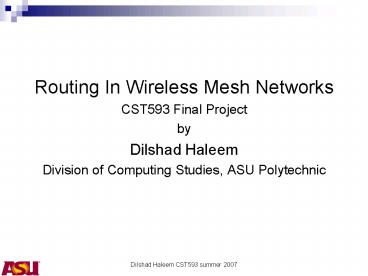Routing In Wireless Mesh Networks - PowerPoint PPT Presentation
1 / 22
Title:
Routing In Wireless Mesh Networks
Description:
Routing In Wireless Mesh Networks CST593 Final Project by Dilshad Haleem Division of Computing Studies, ASU Polytechnic CST593 Committee Chair : Dr. Bruce R. Millard ... – PowerPoint PPT presentation
Number of Views:176
Avg rating:3.0/5.0
Title: Routing In Wireless Mesh Networks
1
- Routing In Wireless Mesh Networks
- CST593 Final Project
- by
- Dilshad Haleem
- Division of Computing Studies, ASU Polytechnic
2
CST593 Committee
- Chair Dr. Bruce R. Millard
- Member Dr. Alan Skousen
- Member Dr. Timothy E. Lindquist
3
Introduction
- Wireless Mesh Networks are radio based self
configuring networks, with minimal infrastructure
requirements - Nodes operate as host and also as a router
- Reliable, resilient and robust
- Different than Mobile Ad Hoc Networks
4
Architecture
Reference http//www.primidi.com/2005/01/04.html
5
Difference between WMNs and MANETs
- Mesh Routers are relatively static
- No power constraints
- Traffic concentration may be higher in certain
paths (hot spots) - Number of users
6
Ad Hoc On Demand (AODV)
- A protocol developed for MANETs
- Reactive in operation
- Route discovery and maintenance using control
packets (RREQ, RREP, RERR and HELLO) - Uses minimum hop count as the performance metric
7
Problem Statement
- Creating Wireless Mesh Network and Ad Hoc Network
scenarios in OPNET Modeler - Simulating AODV in Wireless Mesh and Wireless Ad
Hoc Networks - Performance comparison
- Implementation of Expected Transmission Count
(ETX) as a Process Model in OPNET
8
Wireless Ad Hoc Network VS WMN
9
AODV and WLAN Parameters
10
Simulation ResultsEnd to End Delay
- High Delay is observed in WMN
- Probable reason, nodes closer to the GW, are
relaying theirs and other nodes traffic - MAC layer Fairness
11
Simulation ResultsRouting Traffic Received
- More RREQ and RREP in Ad Hoc Network
- Routes do not change frequently in WMN
- Mostly in case of node failure or new node
joining
12
Simulation ResultsRouting Traffic Sent
13
Simulation ResultsThroughput
- Less throughput is observed in WMN
- Throughput decreases as the number of hops
increases
14
Simulation ResultsThroughput of node_7 node_9
- Node_7 enjoys a higher throughput, than node_9
- Node_9 is 3-hops away from the Gateway
15
Expected Number of Transmission (ETX)
- Routing Protocol must be aware of the consequence
of path selection - Routing protocol must be aware of the link
condition - Link layer performance metric, ETX is the loss
rate of broadcast packets between pair of nodes
16
Implementation of ETX
- Nodes broadcast probe packets(134 bytes) once per
second - Nodes keep track of the number of probes received
in 10 seconds - Reverse delivery ratio pkt rcvd / pkt sent
- Forward delivery ratio is obtained from the
neighbors probe
17
Implementation of ETX in OPNETNode Model
- Pkt_src processor generates probe packets
- Calc_ETX module calculates ETX
- Rcv and xmt modules rcv and tx the packets
18
Implementation of ETX in OPNETCalc_ETX Process
Model (FSM)
- INIT state performs initialization of State
variables - Time_out state reset the packet count every 10
seconds and calculates ETX - Idle state waits until a packet needs to be sent
or received
19
Implementation of ETX in OPNETCalc_ETX Network
Model
- 2 nodes Network Model
- Data rate is set to 11Mbps
20
Simulation Results of ETX Model
- Reverse Delivery Ratio pkt rcvd / pkt sent
10/10 1 - Forward Delivery ratio, piggybacked
- on neighbors probe 1
21
Simulation Results of ETX ModelLink ETX
- Link ETX 1
- This implied a perfect link
- As link ETX increases link quality decrease
- ETX quantify the link
22
Conclusion
- MANETs routing protocols are not suitable for
WMNs - Simulation confirmed that, throughput decreases ,
when AODV is used in WMNs - Routing protocol should be aware of the link
condition - Implementation of link quality metric (ETX) model
in OPNET































